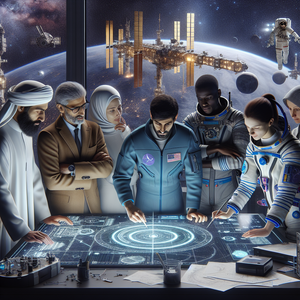Building a New Space Economy

One of the most significant developments in the new space economy is the emergence of space tourism. Blue Origin's New Shepard spacecraft has demonstrated the feasibility of suborbital flights for civilians, allowing passengers to experience weightlessness and witness the curvature of the Earth. This burgeoning industry promises to create a plethora of job opportunities, from hospitality roles in space resorts to flight training for future space tourists. For instance, as private companies begin to operate space hotels, professionals in event planning, customer service, and safety management will be essential to ensure that tourists have a safe and enjoyable experience. A prime example is Blue Origin's own plans for orbital missions that envision a future where space hotels are a reality. Moreover, as the demand for space tourism grows, so too will the need for engineers and technicians to maintain and upgrade the spacecraft, providing stable career paths for those with a passion for aerospace technology. Supporting this trend, early adopters of space tourism, such as Richard Branson's Virgin Galactic and SpaceX, are already venturing into this market. These initiatives not only validate the feasibility of space tourism but also encourage investment in associated infrastructures, such as training facilities, spacecraft maintenance hubs, and hospitality services, further amplifying job creation.
Asteroid Mining: The Next Frontier
Beyond tourism, asteroid mining presents another exciting frontier in the space economy. Blue Origin's long-term vision includes the extraction of valuable resources from asteroids, which could revolutionize industries on Earth. Precious metals, water, and other materials found in space could significantly reduce the costs of space exploration and even contribute to Earth's resource management. To support this burgeoning industry, a skilled workforce will be necessary. Geologists, engineers, and robotics specialists will be in high demand to develop the technology and methods required for successful mining operations in the harsh environment of space. As seen with companies like Planetary Resources and Deep Space Industries, the potential for mining asteroids is not just theoretical. These companies are laying the groundwork for future operations, which will require a multi-disciplinary approach. Universities and educational institutions are already adapting their curricula to meet these needs, focusing on interdisciplinary studies that combine elements of engineering, environmental science, and space law. For instance, programs that specialize in space resource utilization or planetary geology are becoming more prevalent, ensuring that the next generation of workers is equipped with the knowledge and skills required for this exciting field.
Sustainable Living in Extraterrestrial Environments
As we consider life beyond Earth, the concept of sustainable living in extraterrestrial environments becomes paramount. Blue Origin envisions a future where humans can thrive on the Moon or Mars, necessitating innovations in agriculture, waste management, and habitat construction. This vision opens up a range of career opportunities for professionals dedicated to sustainability and environmental science. For example, agricultural engineers could play a crucial role in developing closed-loop systems for food production on other planets. Initiatives such as NASA’s Veggie project, which experiments with growing food in space, highlight the potential for sustainable agriculture in extraterrestrial settings. Similarly, architects and urban planners will need to design habitats that can withstand the extreme conditions of space while providing a livable environment. The interdisciplinary nature of these challenges will encourage collaboration among scientists, engineers, and policy-makers, fostering an innovative workforce capable of tackling complex problems. Organizations like the International Space Station (ISS) have already begun testing these concepts, providing valuable data that will inform future developments in sustainable living off-Earth.
The new space economy, spearheaded by companies like Blue Origin, is not just about the thrill of exploration; it is about creating sustainable industries and job markets that will drive humanity’s future in space. From space tourism to asteroid mining and sustainable living, the opportunities are vast and varied. As educational institutions evolve to prepare the next generation of professionals, the potential for growth in this sector is boundless. Embracing this new frontier not only promises exciting careers but also the chance to be a part of humanity's greatest adventure: exploring and living among the stars. As we look ahead, it is clear that the space economy is not merely a niche market but a dynamic and essential component of our future. Companies like Blue Origin are leading the charge, creating a ripple effect that will ultimately benefit industries across the globe while inspiring individuals to pursue careers in this thrilling new domain. The future is bright, and the cosmos awaits.
Space Tourism Operations Manager
Blue Origin, Virgin Galactic, SpaceX
Core Responsibilities
Oversee the daily operations of space tourism facilities, ensuring safety and customer satisfaction.
Coordinate with engineering teams to maintain spacecraft and manage logistics for space flights.
Develop and implement training programs for staff to deliver exceptional customer service in a unique environment.
Required Skills
Experience in hospitality or event management, preferably in high-stakes environments.
Strong organizational and leadership skills, with a background in aerospace or tourism management.
Familiarity with safety regulations and protocols in aerospace operations.
Space Resource Geologist
Planetary Resources, Deep Space Industries, NASA
Core Responsibilities
Conduct geological surveys of asteroids and other celestial bodies to assess resource availability.
Collaborate with engineers to design mining plans and strategies, ensuring efficient extraction of materials.
Analyze samples and data to inform mining operations and resource management on Earth.
Required Skills
Advanced degree in geology or planetary sciences, with a focus on extraterrestrial materials.
Proficiency in remote sensing technologies and data analysis software.
Experience with fieldwork and sampling techniques in challenging environments.
Aerospace Environmental Engineer
NASA, ESA (European Space Agency), Blue Origin
Core Responsibilities
Develop sustainable systems for waste management and resource utilization in extraterrestrial habitats.
Design closed-loop ecological systems for food production and life support in space.
Assess environmental impacts of proposed space missions and habitats, ensuring compliance with regulations.
Required Skills
Degree in environmental engineering or a related field, with a focus on sustainability.
Experience with system design and lifecycle analysis in aerospace applications.
Strong problem-solving skills and ability to work in multidisciplinary teams.
Spacecraft Maintenance Technician
SpaceX, Rocket Lab, Blue Origin
Core Responsibilities
Perform routine and emergency maintenance on spacecraft systems and equipment.
Collaborate with engineers to troubleshoot technical issues and implement modifications as needed.
Conduct pre-flight checks and ensure compliance with safety standards and protocols.
Required Skills
Technical degree in aerospace technology or a related field, with hands-on experience in spacecraft systems.
Familiarity with electrical, mechanical, and software systems used in space vehicles.
Strong attention to detail and ability to work under pressure in a high-stakes environment.
Extraterrestrial Habitat Architect
NASA, Blue Origin, private aerospace firms
Core Responsibilities
Design habitats for human living on the Moon or Mars, focusing on safety, sustainability, and comfort.
Collaborate with engineers and scientists to integrate advanced technologies into habitat designs.
Conduct research on materials and construction methods suitable for extraterrestrial conditions.
Required Skills
Degree in architecture, with a specialization in sustainable design or aerospace structures.
Experience with computer-aided design (CAD) software and 3D modeling tools.
Strong understanding of environmental conditions in space and their implications for habitat design.


